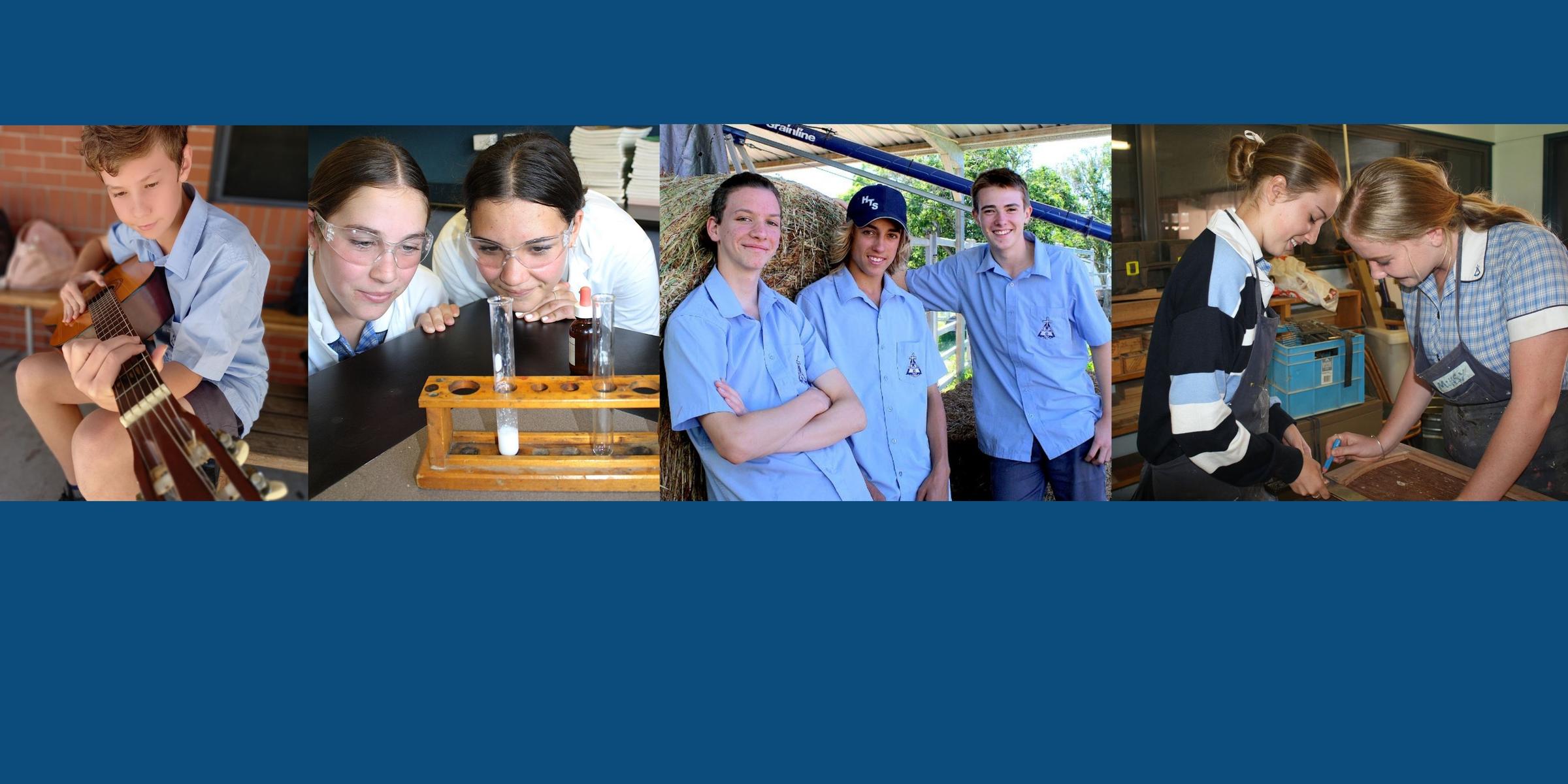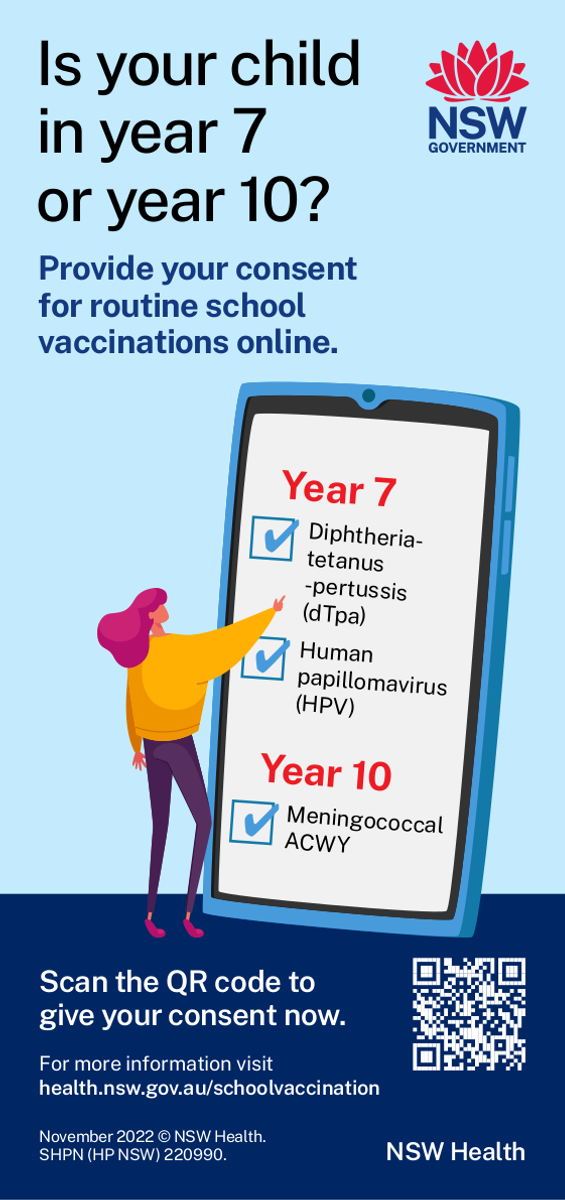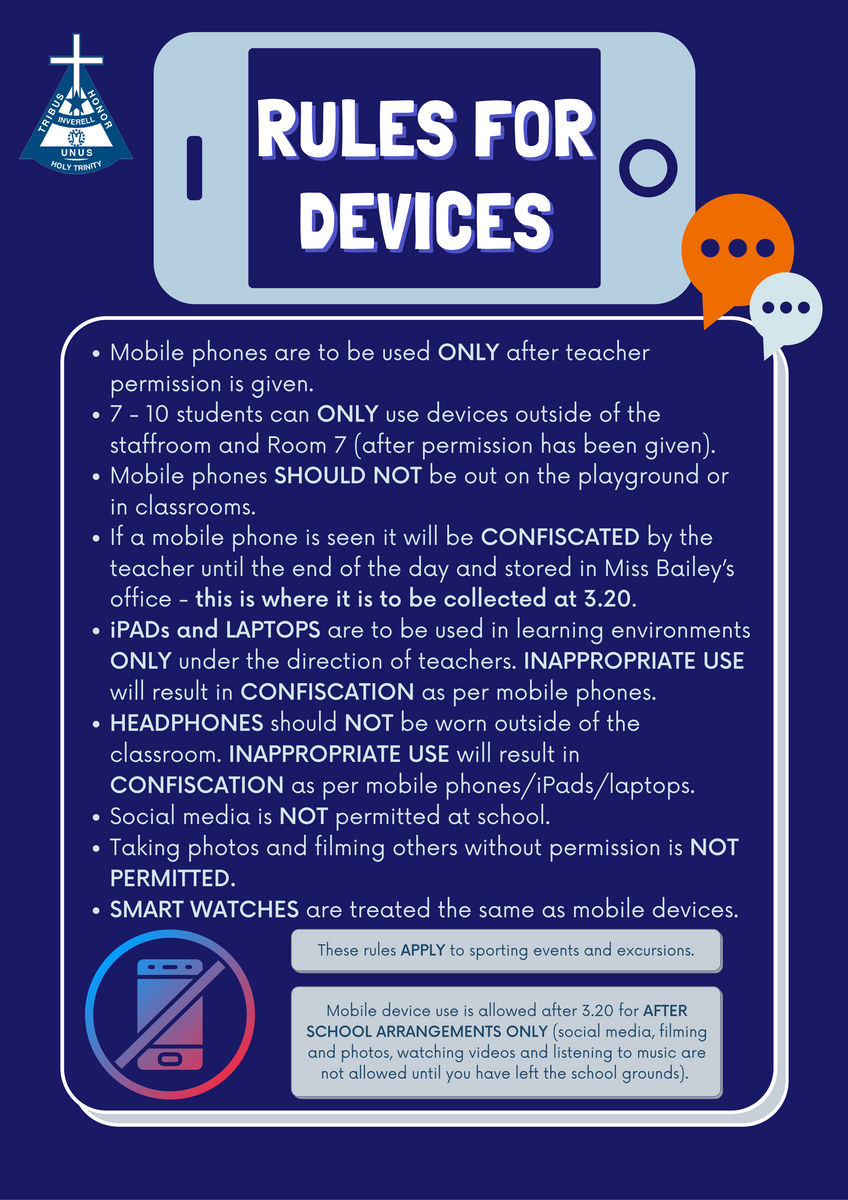SECONDARY NEWS
From the Assistant Principal
Miss Kim Bailey
kbailey@arm.catholic.edu.au

SECONDARY NEWS
From the Assistant Principal
Miss Kim Bailey
kbailey@arm.catholic.edu.au
Family Conferences will be held in Week 8 on the following nights for students in Years 7 - 10.
BOOKINGS WILL OPEN IN WEEK 7
On each of the afternoons, teachers will be available from 3.45 – 5.45 pm in the Holy Trinity Hall. As in past years, parents are strongly encouraged to bring their children with them to take part in the conversation. The conferences will allow you to discuss your child’s progress with each of his/her subject teachers. Each meeting will be restricted to a five-minute maximum per subject; this should allow all conferences to take place in the allotted time. Should there be a need for an extended discussion, arrangements can be made with the teacher concerned or with the Assistant Principal.
The Family Conferences offer an opportunity for you to find out how your child is getting on with classmates, if there are areas in which they excel, any aspects which are causing difficulties, and what they can do at home to build on their strengths or to overcome any weaknesses. Teachers are helped considerably by getting to know parents and by gaining information from them that can enhance their child’s educational and social experiences.
The protocols are as follows:
BOOKINGS ARE NOT YET OPEN ON COMPASS.
A MESSAGE WILL BE SENT VIA COMPASS WHEN THE BOOKINGS ARE OPEN.
Rugby League Trials
Good luck to the U15 and U16 Rugby League players who are participating in the Diocesan trials in Lismore today. We wish the following students all the best - Toby Beveridge, Dustin Ford, Angus Norman and Matilda Thompson.
U15's Diocesan Netball Trials
Good luck to all netballers heading to Armidale on Wednesday.
Science & Engineering Challenge
Good luck to Mrs Hiscock and the students involved in Friday's annual Rotary Science and Engineering Challenge.
Congratulations to all the students who attended the social last Thursday night. They certainly got into the 'Neon' theme and had a great night.
Congratulations to our swimmers who represented the school at the diocesan carnival last week in Gunnedah.
The Welcome Barbeque that was held last week was a great success with many parents and students taking the opportunity to meet with teachers in the Secondary Quadrangle. It was also a time when families could chat amongst themselves, meet the Secondary staff and ask any questions that they needed to. We appreciate the effort that parents made, and once again reiterate to all families to contact the school if there are concerns.
The first social for the year was also held last week. Year 10 students organised the music and an entertaining evening eventuated. The social was a terrific welcome for the new students in the Secondary. Year 10 students demonstrated their intentions to make a difference in 2024, and they are to be congratulated for the well-run event. All members of the SRC from 7-10, and some other willing volunteers, were rostered on to run the canteen on the night. Thanks to Miss Cush for overseeing and organising the social.
Year 7 students received their iPads last Thursday at an information session after the Welcome BBQ. Students are able to put a screen protector on their device, and they are encouraged to also look into purchasing an Apple Pencil. These accessories aren't mandatory and are paid for by families.
Students in Years 7 & 9 will be involved in NAPLAN testing starting next week. The testing window opens on Wednesday 13 March and closes on Monday 25 March. All tests will be online. It is important that these dates are kept free from appointments so that students will be able to complete the assessment in the allocated time. If students miss any tests they will be able to make them up during the test window.
Mrs Townsend and Mrs McLachlan have spoken to Year 10 students about the upcoming Health Careers Forum in Tamworth. Students attending the forum will need to make their own travel arrangements to attend this event. If you require further details please contact Mrs Townsend or Mrs McLachlan.
Term 1 Progress Reports will be distributed towards the end of Week 6.
The purpose of the Term 1 Progress Report is to provide a snapshot of your child's progress at this stage of the school year. If you would like to discuss any aspect of this report, you may contact Miss Bailey or the subject teacher.
Respectful behaviour includes interactions with staff and peers. It also includes the use of school equipment and resources.
Focused on learning provides an indication of a student's level of contribution to the learning environment and responsibility for their learning as well as consideration for the learning of others.
Completion of set tasks includes all classwork, homework and assessments.
Preparation is being ready to participate and engage in class each day. Being organised for learning involves doing home study, revising, completing required work, and bringing the necessary equipment, including uniforms and iPads.
In 2024 the following vaccines will be offered:
In Year 7, students are offered free vaccines for diphtheria-tetanus-pertussis (dTpa) and human papillomavirus (HPV). In Year 10, students are offered the meningococcal ACWY vaccine.
If your child is in Year 7 or Year 10 this year, you can now provide online consent for their routine school vaccinations.
Vaccination will only be provided at school if consent has been received.
How to provide consent:
If you or your child do not have a Medicare card, consent can still be provided by requesting a paper-based consent form directly from your child’s school.
The benefits of providing consent online:
• easily update your child’s details
• receive SMS and/or email notifications when vaccinations are given
• faster upload of vaccination records to the Australian Immunisation Register (AIR).
For more information on routine school vaccinations, please visit
www.health.nsw.gov.au/schoolvaccination.
If you require information in your language, please visit:
www.health.nsw.gov.au/immunisation/Pages/school_vaccination_language.aspx


them to hear audio during the assessment.
Please contact the school if you have any questions regarding the Transition to Year 7 Assessment.
If you have any questions or concerns about your child's learning or wellbeing, please make contact with Miss Bailey, your child's Pastoral Care teacher or their subject teacher. We are only too happy to assist.
Year 7:
7E - Mr Peter Ehsman
7J – Mr Jack Jeffery
7K - Miss Kristina Majetic
7M – Mrs Veronica McCormick
Year 8:
8G - Mr Anthony Gaias
8M - Mrs Christine McLachlan
8T - Mrs Kathy Townsend
8W - Mr Sam White
Year 9:
9C – Miss Claudia Cush
9E - Mrs Angela East
9U - Mr Uebergang
Year 10:
10B - Miss Kim Bailey
10K - Mr David Koch
Students and parents are encouraged to approach the relevant Pastoral Care teacher if they need assistance.
Stage Leaders
Stage 4 - Mr Anthony Gaias
Stage 5 - Mrs Angela East
Miss Kim Bailey
Miss Claudia Cush
Mrs Claudia Dolbel
Mrs Angela East
Mr Peter Ehsman
Mr Anthony Gaias
Miss Alana Goldman
Mrs Mary-Jane Guest
Mrs Malynda Hiscock
Mr Jack Jeffery
Mr David Koch
Miss Kristina Majetic
Mrs Veronica McCormick
Mrs Christine McLachlan
cmclachlan@arm.catholic.edu.au
Mr Matthew Pye
Mrs Jane Taylor
Mrs Katherine Townsend
Mr Blake Uebergang
Mrs Carrie Watchirs
Mr Sam White
Staff can be contacted directly using the email address above or via the Compass portal.


Students are not permitted to use their devices unless instructed by a teacher. This includes both the classroom and the playground. The students are aware of this policy and receive constant reminders in Pastoral Care, their teaching classes and there are also many posters displayed all around the school.
If a student needs to use their device, they must first seek permission from a teacher and use it in an area designated by the teacher. This is usually under their direct supervision or outside the Secondary staffroom.
If students are unable to follow this policy, then their phone is confiscated and placed securely in Miss Bailey's office, where it is collected by the student at the end of the school day.
Teachers record each time a device has been confiscated. After the device has been confiscated for a second time, the device remains at school until it can be collected by a parent/carer.
Artificial light from electronic and other devices generally emits a blue light (it may not look blue, but that is the underlying light). Blue light is a type of non-visible light at a very short wavelength.
What does blue light do to the human body?
Non-visible light has a lot of energy, and studies show that a lot of exposure to this type of light can impair your sleep cycle. During sleep lots of essential physical processes take place and it is also when learning from the day is consolidated in memory. This means that having enough sleep is vital for students.
Blue light is naturally generated only during the day, from sunlight. When it gets dark, naturally occurring blue light ceases, signalling the body to produce melatonin, the hormone associated with sleep. Using artificial lighting and devices which emit a blue light at night confuses the body-clock (the body’s natural sleep-wake cycle) by stopping the body from producing melatonin. This can result in disrupted sleep patterns, including difficulty in falling asleep, staying asleep and shortened sleep duration.
Those at greatest risk from night-time exposure to blue light are those with existing sleep disorders and adolescents who often experience delayed sleep patterns as a result of biological changes.
What can students do to limit their exposure to blue light at night?
Some suggestions include:
Here are 5 reasons you can give your child as to why they should start working on their assignments immediately.
1. GET YOUR BRAIN THINKING ABOUT THE TOPIC: Even if your assignment isn’t due for weeks, start thinking about it immediately. At the very least, answer the key starter questions on the day you get your assignment. Even if you are not thinking about it directly, your subconscious will be hard at work.
2. FIND LIBRARY RESOURCES: Although the school or local library will probably not be your main source of reference, you should drop in soon after receiving the assignment. Your teacher will probably have alerted the school librarian to the assignment, and reference books, magazines etc., may well be displayed. These will disappear quickly if the whole class has the same assignment. Books, periodicals, and magazines can sometimes be a useful general overview for an assignment, and they help to clarify a direction as you begin to immerse yourself into the assignment topic. It is not a good idea to only use Google!
3. DISCOVER OTHER RESOURCES: You could also ask your local librarian for any additional direction on where to look for resource material for your assignment. Librarians are often your best source of information. They know how to help people access relevant and appropriate information, in books, the Internet or computer-based references. One of the challenging aspects of Internet-based searches for school students is the complexity, language and purpose of websites, not to mention bias and reliability.
4. STARTING EARLY MEANS MORE TIME TO EXPLORE & ASK FOR HELP IF NEEDED: If you do some initial research on the assignment points you’ve identified through the library, references your teacher may have given you, school textbooks, and general internet search engines, you could find yourself having more direction in your research. For example: Perhaps there isn’t enough information, or perhaps you find you don’t understand important concepts, or perhaps you need to speak to your teacher to get further clarity. If you find this out early, you will still have plenty of time to plan, research, write and present your assignment. Imagine if you didn’t start your assignment for a week or so, and then discovered you needed more guidance. You could easily run out of time.
5. CREATE A SAFETY NET: Starting your assignment immediately will give you a safety net in case you get sick, or something unexpected happens. Assignments usually require a large amount of time; students must plan a strategy or schedule to ensure they are completed. You should always have a schedule that allows for the unexpected.
So get started today!